Beginners Guides
Ceiling Fan Fall
2025
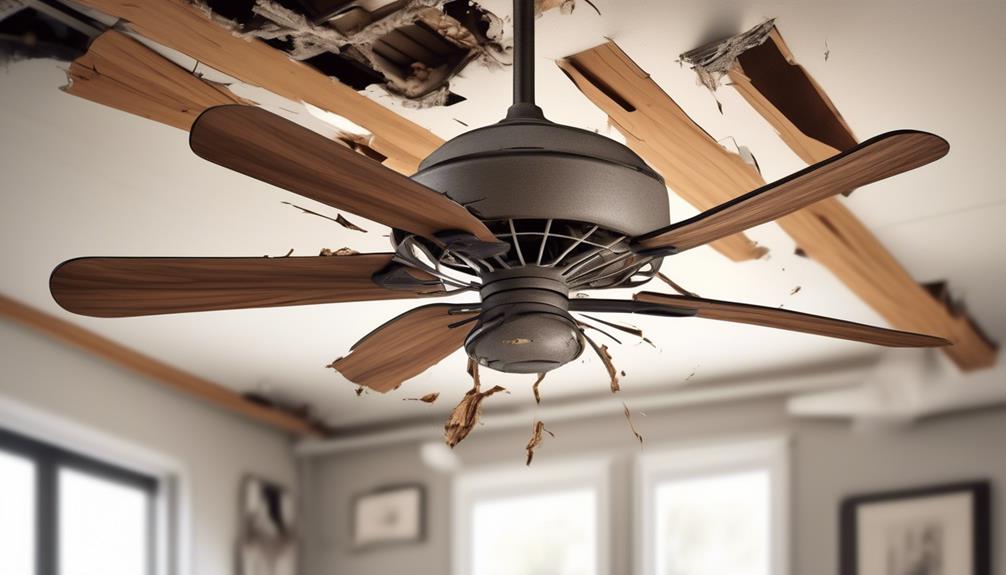
We have all heard about the alarming incident where a badly installed ceiling fan fell from the ceiling, causing significant damage.
But what are the common causes behind such unsettling events, and how can they be prevented?
We'll explore the potential injuries that can result from ceiling fan falls and provide essential tips for securing ceiling fans, along with the importance of using proper mounting hardware.
Stay tuned to learn more about the crucial steps to ensure the safety of your ceiling fans and those around them.
Key Takeaways
- Improper installation or mounting can lead to ceiling fan falls.
- Regular maintenance, such as cleaning and adjusting fan blade balance, is important for ceiling fan safety.
- Using proper mounting hardware is crucial for stability and safety.
- Raising awareness and taking proactive measures can help prevent ceiling fan falls and related injuries.
Common Causes of Ceiling Fan Falls
Ceiling fan falls often occur due to improper installation or mounting, leading to potential hazards and accidents.
One common cause of ceiling fan falls is the lack of proper fan blade balance. When the fan blades aren't balanced correctly, it can cause excessive wobbling, leading to stress on the mounting and eventual failure. This imbalance can also result in excessive noise and reduced efficiency of the fan.
Another significant factor contributing to ceiling fan falls is the compromised structural integrity of the mounting hardware or the ceiling itself. Over time, the screws and anchors used for mounting the fan can loosen, or the ceiling material may weaken, unable to support the weight of the fan.
Regular inspection and maintenance of the mounting hardware and the ceiling's structural integrity are crucial in preventing potential accidents.
Understanding these common causes of ceiling fan falls empowers homeowners to take proactive measures in ensuring the safe installation and maintenance of their ceiling fans.
Potential Injuries From Ceiling Fan Falls

When a ceiling fan falls, it poses a significant risk of causing severe injuries to anyone in its vicinity. The potential injuries from ceiling fan falls can range from minor cuts and bruises to more severe head trauma and fractures. It is crucial to understand the potential risks involved and take necessary precautions to prevent accidents. According to data from the National Electronic Injury Surveillance System, there were approximately 19,000 emergency room visits related to ceiling fan injuries in the United States in 2020 alone. These statistics underscore the importance of raising awareness about the potential injuries associated with ceiling fan falls and taking proactive measures to mitigate the risks.
| Type of Injury | Description | Risk Level |
|---|---|---|
| Cuts and Bruises | Minor lacerations and contusions | Low |
| Head Trauma | Concussions or skull fractures | High |
| Fractures | Broken bones in extremities or spine | Moderate |
Understanding the potential injuries from ceiling fan falls can serve as a catalyst for promoting safety measures and preventing accidents. By being mindful of the risks and implementing appropriate safety precautions, we can strive to reduce the number of emergency room visits resulting from ceiling fan-related injuries.
Tips for Securing Ceiling Fans
To ensure safety and prevent potential injuries, it's essential to implement effective strategies for securing ceiling fans.
One key tip is to use securing brackets when installing a ceiling fan. These brackets provide extra support and stability, reducing the risk of the fan coming loose or falling. It's crucial to follow the manufacturer's instructions and use the appropriate brackets for your specific fan model.
Additionally, regular maintenance is vital for keeping ceiling fans secure. Checking the fan blade balance and making adjustments as needed can help prevent wobbling or shaking that may lead to instability over time. Ensuring that the fan blades are properly balanced not only enhances safety but also promotes efficient operation.
When securing a ceiling fan, it's important to pay attention to every detail to minimize the risk of accidents. By following these tips and staying proactive in maintenance, you can create a safer environment and enjoy the comfort and benefits of ceiling fans with peace of mind.
Importance of Using Proper Mounting Hardware
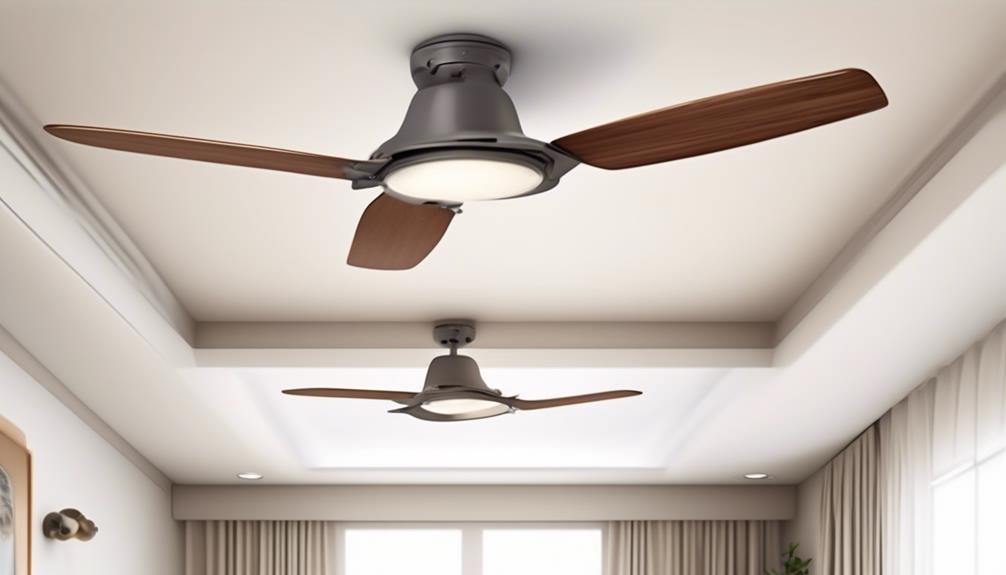
Using the correct mounting hardware is crucial for ensuring the stability and safety of a ceiling fan. Proper installation of a ceiling fan requires the use of suitable mounting hardware that's designed to support the weight and movement of the fan. Safety precautions should always be taken into consideration when installing a ceiling fan, and using the right mounting hardware is a fundamental aspect of this process.
When selecting mounting hardware for a ceiling fan, it's essential to choose components that are specifically recommended by the manufacturer. This ensures that the hardware is compatible with the fan and capable of withstanding the forces exerted during operation. Additionally, following the manufacturer's guidelines for proper installation and using the recommended mounting hardware helps to minimize the risk of accidents, such as the fan falling from the ceiling.
Regular Maintenance for Ceiling Fan Safety
Regularly maintaining a ceiling fan is essential for ensuring its long-term stability and safety, building upon the importance of using proper mounting hardware. Ceiling fan cleaning and fan blade balance are crucial aspects of regular maintenance that contribute to its safe and efficient operation. Cleaning the fan prevents the accumulation of dust and dirt, which can affect its performance and lead to potential safety hazards. Additionally, ensuring that the fan blades are properly balanced is essential for preventing wobbling and potential detachment from the motor, which could result in a dangerous situation.
To emphasize the importance of regular maintenance, we've compiled a table illustrating the potential risks of neglecting ceiling fan maintenance and the corresponding benefits of regular upkeep.
| Neglecting Maintenance | Regular Maintenance |
|---|---|
| Accumulation of dust and dirt affecting performance | Clean fan for optimal operation |
| Unbalanced fan blades leading to wobbling | Ensure proper blade balance for safety |
Frequently Asked Questions
Can Ceiling Fan Falls Cause Damage to the Ceiling or Surrounding Area?
Ceiling fan falls can cause significant damage to the ceiling and surrounding areas. Preventive measures such as regular maintenance and ensuring proper installation can minimize the risk.
However, if a ceiling fan does fall, repair costs can be substantial, including fixing the ceiling, addressing any structural damage, and replacing the fan.
It's important to take proactive steps to prevent these incidents and minimize potential repair expenses.
Are There Any Specific Safety Regulations or Standards for Ceiling Fan Installation?
We take safety regulations for ceiling fan installation seriously. Following these guidelines is crucial to prevent household accidents, permanent injuries, and surrounding damage. Neglecting them can lead to long-term injuries and legal implications.
It's vital to ensure proper installation to uphold safety standards. The ceiling fan's correct installation is paramount for its efficient operation and the safety of everyone in the household.
How Common Are Ceiling Fan Falls Compared to Other Household Accidents?
Prevention methods and safety precautions are crucial in reducing household accidents. Statistics show that ceiling fan falls are less common compared to other accidents, such as slips and falls. However, these incidents can still cause serious injuries and require prompt emergency response.
It's important to follow proper installation guidelines and regularly check the stability of ceiling fans to prevent potential accidents.
Can Ceiling Fan Falls Result in Long-Term or Permanent Injuries?
Long-term effects of ceiling fan falls can lead to serious injuries. Prevention measures like using appropriate installation and regularly checking for loose screws can greatly reduce the risk.
However, even with precautions, accidents can still happen. It's important to be aware of potential dangers and take necessary steps to minimize the risk of long-term or permanent injuries.
We must prioritize safety to avoid the lasting impact of such incidents.
Are There Any Legal Implications for Not Securing a Ceiling Fan Properly?
There can be legal consequences and liability concerns for not securing a ceiling fan properly. Negligence in installation or maintenance can result in property damage or personal injury.
It's important to adhere to building codes and manufacturer's guidelines to avoid legal implications. Failure to do so could lead to lawsuits, fines, or insurance claims.
Properly securing a ceiling fan is crucial to mitigate potential legal issues and ensure safety.
Can a Ceiling Fan Falling Cause It to Only Work on High Speed?
When troubleshooting ceiling fan speed, one common issue is a ceiling fan falling can cause it to only work on high speed. The fall can damage internal components, leading to a loss of speed control. It’s important to inspect and repair any damage to ensure proper functionality.
Conclusion
In conclusion, keeping our ceiling fans secure and well-maintained is crucial for our safety. Imagine the peace of mind that comes from knowing our fans won't come crashing down unexpectedly.
By following the tips for securing and maintaining our fans, we can prevent potential injuries and ensure that our homes remain a safe and comfortable place for everyone.
Let's take the necessary steps to keep our ceiling fans in top condition.
- About the Author
- Latest Posts
Introducing Ron, the home decor aficionado at ByRetreat, whose passion for creating beautiful and inviting spaces is at the heart of his work. With his deep knowledge of home decor and his innate sense of style, Ron brings a wealth of expertise and a keen eye for detail to the ByRetreat team.
Ron’s love for home decor goes beyond aesthetics; he understands that our surroundings play a significant role in our overall well-being and productivity. With this in mind, Ron is dedicated to transforming remote workspaces into havens of comfort, functionality, and beauty.
Beginners Guides
The Best Time to Cruise for Budget-Friendly Deals
Fulfill your wanderlust dreams without draining your wallet by learning the key to scoring budget-friendly cruise deals.
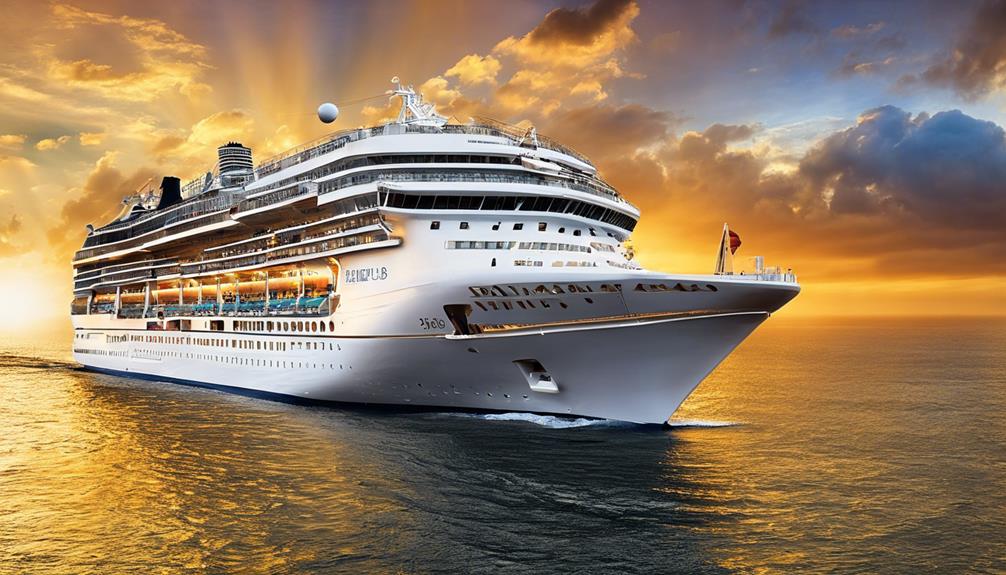
When it comes to finding budget-friendly cruise deals, timing is key. Imagine setting sail on the crystal blue waters of the Caribbean or exploring the stunning glaciers of Alaska without breaking the bank.
There's a specific window of opportunity that savvy cruisers keep an eye on to secure the best rates and save some serious cash. But how do you know when to book your next adventure to make the most of your budget?
Let's uncover the secrets behind scoring the ultimate cruise deals and making your dream vacation a reality.
Key Takeaways
- Booking during wave season in January to March ensures budget-friendly deals.
- Monitoring prices post-booking for drops leads to potential refunds or upgrades.
- Repositioning cruises in spring and fall offer cost-effective options.
- Leveraging loyalty programs maximizes savings for affordable cruising.
Ideal Seasons for Budget-Friendly Cruises
When seeking budget-friendly cruise deals, timing plays an important role in securing the best value for your money. Shoulder seasons such as September, October, and early December present excellent opportunities for travelers looking for cheaper fares. These off-peak times often offer discounted rates and fewer crowds, making it an ideal choice for budget-conscious individuals.
Additionally, booking during wave season in January and February can lead to significant discounts and promotions, maximizing savings on your cruise vacation.
Repositioning cruises during spring and fall are another fantastic option for savvy travelers seeking affordable deals. These cruises often provide cost-effective choices as cruise lines move their ships between different regions.
Avoiding major holidays and school breaks is also key to securing cheaper cruise fares and ensuring a more relaxed cruising experience. Moreover, sailing from Florida during off-peak times can offer a wide range of options and better deals for those looking to save on their cruise adventures.
Strategies for Booking Affordable Cruises
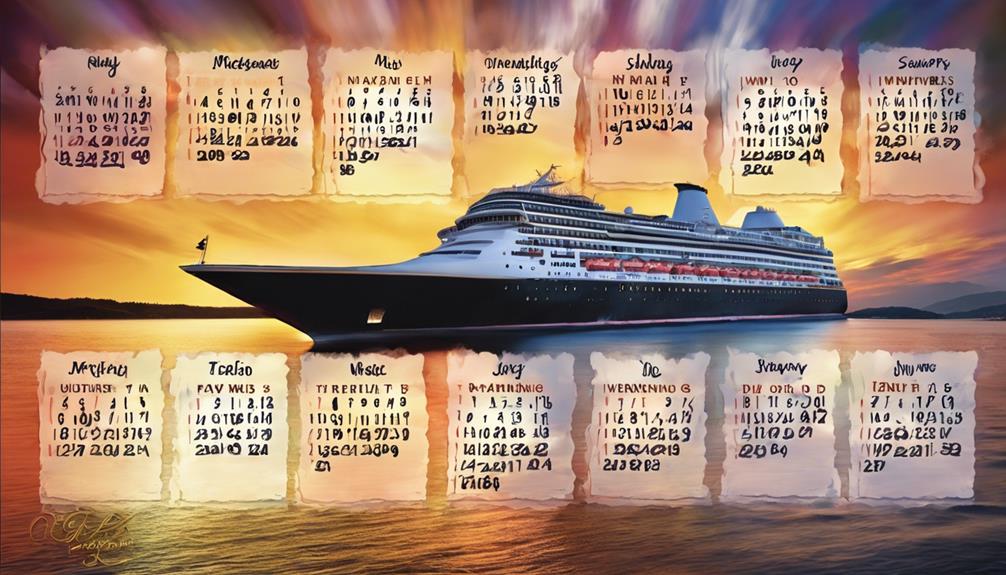
To secure the best deals on cruises, it's important to employ strategic booking approaches that maximize cost savings and value for your vacation. When aiming for budget-friendly cruise deals, consider the following strategies:
- Booking in Advance: Securing your cruise early, especially during wave season from January to March, can lead to lower rates and additional benefits.
- Monitoring Fare Changes: Keep an eye on fluctuating fares and be ready to book when prices drop to secure the best deal.
- Being Flexible with Travel Dates: Flexibility can be key in finding affordable cruise options, as adjusting your travel dates slightly can result in significant savings.
- Considering Repositioning Cruises: Exploring repositioning cruises or sailing during shoulder seasons can offer unique routes and discounted prices.
- Utilizing Loyalty Programs and Off-Peak Times: Take advantage of loyalty programs, monitor price drops, and consider traveling during off-peak times to maximize your savings on cruise vacations.
Best Times to Score Cruise Deals
During wave season from January to March, travelers can capitalize on the best times to secure budget-friendly cruise deals. Booking well in advance is key to snagging the most favorable timing and rates for your cruise.
Additionally, considering repositioning cruises during the spring and fall can offer discounted prices, making them a great option for those seeking budget-friendly deals. It's also advisable to keep an eye out for price drops even after booking, as this could potentially lead to refunds or upgrades for your cruise experience.
Leveraging loyalty programs or memberships can grant you access to exclusive discounts and savings on your upcoming cruise. By being proactive and strategic in your approach to booking and monitoring deals, you can maximize your chances of finding the best cruise deals that align with your budget and preferences.
Timing Tips for Budget-Friendly Cruises

Let's explore practical strategies for maximizing your savings on budget-friendly cruises through strategic timing tips. When aiming to secure the best cruise deals that align with your budget, consider the following insights:
- Booking in Advance: Take advantage of wave season from January to March to lock in lower rates and secure desirable cabin options.
- Monitoring Prices: Keep an eye on price drops even after booking to potentially benefit from refunds or upgrades, enhancing your overall cruise experience.
- Loyalty Programs: Utilize loyalty programs or memberships to access additional discounts and exclusive perks, making your budget-friendly cruise even more cost-effective.
- Nearby Ports: Opt for cruises departing from nearby ports to save on airfare costs, enabling you to allocate more of your budget towards onboard activities and excursions.
- Discounts Galore: Embrace the array of discounts available during wave season and beyond, ensuring that you snag the best possible deal for your budget-friendly cruise adventure.
When to Book for Cruise Savings
Securing cruise savings hinges on strategic timing and proactive booking practices. To find the best deals, consider booking during wave season from January to March when many cruise lines offer enticing discounts.
Booking early not only guarantees better rates but also provides a wider selection of cabin choices. Keep an eye out for fare changes even after booking, as price drops may occur, presenting an opportunity for additional savings.
While waiting for last-minute deals can sometimes lead to the cheapest rates, this approach often comes with limited cabin availability. To stay informed about price fluctuations, utilize tools like the Shipmate app and Cruise Critic for efficient monitoring.
Conclusion
To summarize, cruising during the off-peak season can help us save some serious dough. Booking early during wave season is key to scoring those sweet deals.
So, let's set sail and make some memories without breaking the bank. Remember, early bird gets the worm – or should I say, the cruise discount!
- About the Author
- Latest Posts
Introducing Ron, the home decor aficionado at ByRetreat, whose passion for creating beautiful and inviting spaces is at the heart of his work. With his deep knowledge of home decor and his innate sense of style, Ron brings a wealth of expertise and a keen eye for detail to the ByRetreat team.
Ron’s love for home decor goes beyond aesthetics; he understands that our surroundings play a significant role in our overall well-being and productivity. With this in mind, Ron is dedicated to transforming remote workspaces into havens of comfort, functionality, and beauty.
Beginners Guides
Best Time to Go on an Alaskan Cruise for Wildlife Watching
Get ready to discover the optimal time for wildlife enthusiasts to embark on an Alaskan cruise – the ultimate season for extraordinary encounters awaits!

One could contend that any time of year is fitting for an Alaskan cruise, but if you genuinely want to maximize your wildlife watching opportunities, timing is key.
While many months offer glimpses of nature's wonders, there is a particular period that stands out above the rest.
Join us as we explore the intricacies of the Alaskan wilderness and uncover the secrets of when to set sail on a journey that promises unforgettable encounters with some of the most magnificent creatures on earth.
Key Takeaways
- Prime months for wildlife viewing in Alaska are May, June, and September.
- Peak whale watching season is from mid-June to August.
- Best time for bear spotting is between July and early September.
- Ideal months for bald eagle sightings in southeast Alaska are from May to September.
Prime Months for Wildlife Viewing
During the prime months of May, June, and September, Alaska offers the best conditions for wildlife enthusiasts to observe a diverse array of animals in their natural habitats. June marks the beginning of summer, a time when the landscape comes alive with the sights and sounds of wildlife.
July and August are ideal for witnessing brown bears fishing for salmon and catching glimpses of majestic moose roaming through the wilderness. These months provide ample opportunities for up-close wildlife viewing experiences, especially during the salmon run when bears gather along the rivers to feast.
As the summer changes into September, visitors can look forward to spotting humpback whales during their annual migration, as well as witnessing the spectacular spawning salmon and caribou herds moving across the land. The shoulder seasons offer a unique chance to explore Alaska inside and out, with fewer crowds and mosquitoes, making it an ideal time for wildlife enthusiasts to immerse themselves in the natural beauty of the region.
Peak Whale Watching Season
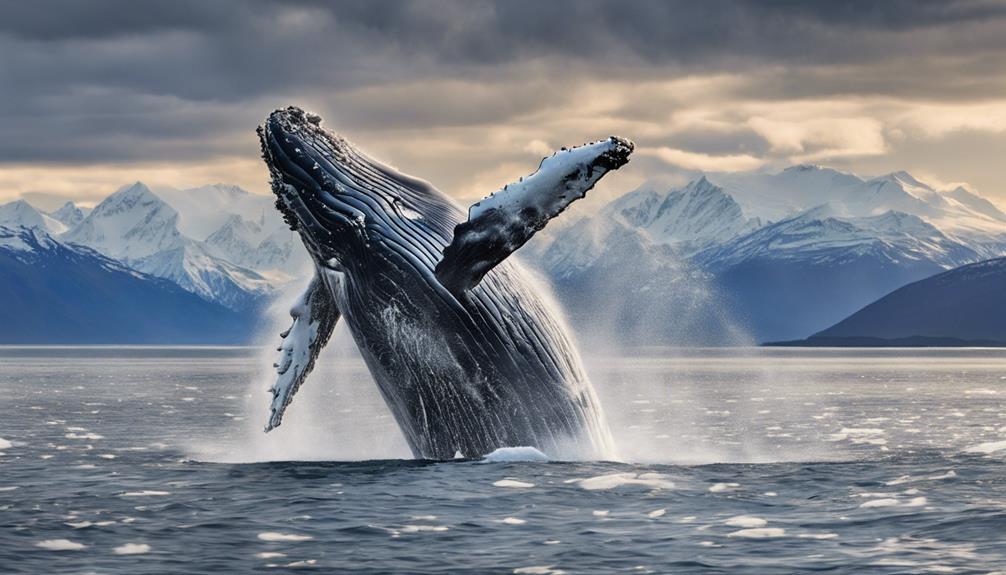
In the peak whale watching season in Alaska, which typically spans from mid-June to August, enthusiasts have the best opportunities to witness humpback whales and other species in their natural habitat. Humpback whales are commonly sighted during the summer months as they feed on small fish and krill.
Killer whales, also known as orcas, are best spotted in May and June near Ketchikan, Juneau, and Seward, hunting for seals and other marine mammals. Grey whales migrate to southern Alaska in late spring, showcasing their impressive breaching behaviors.
Blue whales, the largest animals on Earth, may be seen in July and August, traveling through Alaskan waters in search of food. Whale sightings can vary depending on the specific month of your Alaskan cruise, so choosing the right time within the peak season is important for maximizing wildlife watching opportunities while sailing through these majestic waters.
Best Time for Bear Spotting
Ideally situated between July and early September, the peak time for bear spotting in Alaska coincides with the salmon influx that attracts these magnificent creatures to the creeks and streams of the region. During this period, Grizzly bears can be observed in their natural habitat, offering a thrilling experience for wildlife enthusiasts. Royal Caribbean Cruise Tours in Alaska often include bear viewing excursions, enhancing the opportunity to witness these powerful animals up close. For best bear sightings, consider visiting during the salmon run in July, a time when bears are actively hunting for fish in creeks and streams, particularly in locations like Ketchikan. Alaska's diverse landscapes and ecosystems provide ample opportunities for bear viewing, from observing black bears to encountering majestic brown bears. Whether through guided tours or remote float plane trips, Alaska offers a range of experiences to witness these iconic creatures in their element.
| Best Time for Bear Spotting | |
|---|---|
| July | Salmon run |
| Early September | Grizzly bears |
| Creeks | Streams |
| Ketchikan | Royal Caribbean Cruise Tours |
Ideal Months for Eagle Sightings

The peak months for perfect bald eagle sightings in southeast Alaska are from May to September. During these months, as part of an Alaska cruise, birdwatching enthusiasts can witness the majestic bald eagles in their natural habitat. Southeast Alaska, home to around 30,000 bald eagles, offers ample opportunities for wildlife watching, especially near bodies of water where eagles are commonly spotted.
The Sitka Cultural Discovery excursion is a great way to observe bald eagles up close, as they're frequently seen near streams and bodies of water. With approximately 470 bird species in the region, including the iconic bald eagle, Southeast Alaska provides a diverse birdwatching experience for nature lovers.
Whether soaring through the skies or perched on branches overlooking the water, bald eagles are a common sight throughout the summer months in this pristine Alaskan wilderness. For those seeking unforgettable eagle sightings and a chance to immerse themselves in Alaska's rich wildlife, visiting during the peak months offers an unparalleled birdwatching experience.
Optimal Time for Otter Encounters
Best timing for observing otters in Alaska ranges from early spring through the end of July. During this period, the chances of encountering these enchanting creatures are at their peak. Here are some key points to keep in mind for prime otter encounters during your Alaskan cruise:
- Steller sea lions: While otters are more prevalent during spring and early summer, Steller sea lions can be spotted year-round in Alaska. Keep an eye out for these majestic marine mammals as they often share habitats with otters.
- Streams and creeks: Otters are frequently seen near streams and creeks, making these areas prime locations for wildlife watching. Cruise along these waterways to increase your chances of a memorable otter sighting.
- Wildlife tours: Participating in wildlife tours in Alaska can enhance your otter encounters. These tours often provide opportunities to get up close to Steller sea lions, with otters sometimes making surprise appearances alongside them.
- Sea otters near the ocean: Whether near the ocean or inland water bodies, otters are adaptable creatures that thrive in various environments. Keep a lookout for these playful animals during your Alaskan cruise for a truly immersive wildlife experience.
Conclusion
To sum up, our investigation confirms that the best time to go on an Alaskan cruise for wildlife watching is indeed during the peak season of July.
The abundance of wildlife sightings, perfect weather conditions, and increased chances of spotting bears, whales, eagles, otters, and other fascinating creatures make July the ideal month for an unforgettable Alaskan wildlife experience.
Don't miss out on this prime opportunity to witness the wonders of nature in their natural habitat.
- About the Author
- Latest Posts
Introducing Ron, the home decor aficionado at ByRetreat, whose passion for creating beautiful and inviting spaces is at the heart of his work. With his deep knowledge of home decor and his innate sense of style, Ron brings a wealth of expertise and a keen eye for detail to the ByRetreat team.
Ron’s love for home decor goes beyond aesthetics; he understands that our surroundings play a significant role in our overall well-being and productivity. With this in mind, Ron is dedicated to transforming remote workspaces into havens of comfort, functionality, and beauty.
Beginners Guides
The Best Time to Go on an Alaskan Cruise
Journey through the Alaskan wilderness at its prime, uncovering the unique factor that sets the best time to go on an Alaskan cruise apart.

When considering the best time to start on an Alaskan cruise, May and September emerge as the top contenders. These shoulder seasons present an array of advantages that cater to both seasoned travelers and those new to cruising.
With the promise of better deals, reduced crowds, and lower prices, an Alaskan adventure during these months is not only cost-effective but also offers a more intimate experience of the region's breathtaking beauty.
However, there is one important factor that sets apart these shoulder seasons from the rest, and it's not just about cost or crowd size.
Key Takeaways
- Late-May to mid-June: prime for wildlife photography and bear sightings.
- Mid-June to August: ideal weather, ample sunlight, and wildlife encounters.
- Early September: peaceful cruise experience with fall foliage views.
- Late September: witness the mesmerizing Northern Lights on Alaskan cruises.
Best Time for Wildlife & Activities
In late-May to mid-June, we find the ideal time for capturing stunning wildlife photography in Alaska. As the daylight hours extend, providing ample opportunities to witness the natural beauty, this period is perfect for spotting humpback whales breaching the waters or observing bears feasting on the abundance of salmon. Cruise excursions during this time offer unforgettable experiences, allowing you to witness the wildlife in their natural habitat.
Denali National Park opens its doors to wildlife enthusiasts in mid-May, providing a chance to explore the diverse flora and fauna. Additionally, different species of salmon reach their peak at varying months, creating a dynamic environment for wildlife viewing. For those interested in experiencing the vibrant fall foliage, early to mid-September showcases Alaska's landscape in a breathtakingly colorful display, attracting wildlife like never before. Whether you're an avid photographer or a wildlife enthusiast, late spring to early summer is the best time to commence on an Alaskan adventure.
Ideal Months for Good Weather

Mid-June to August stands out as the prime window for experiencing excellent weather conditions during an Alaskan cruise, offering temperatures ranging from 50-70°F and up to 22 hours of sunlight, ideal for enjoying outdoor activities and remarkable wildlife sightings. The pleasant weather in mid-summer guarantees a comfortable and enjoyable cruise experience amidst Alaska's stunning natural surroundings. This period is perfect for wildlife viewing, with sightings of brown bears, moose, whales (belugas, humpbacks, orcas), seals, and dolphins being quite common.
- Warm temperatures ranging from 50-70°F
- Up to 22 hours of sunlight
- Excellent wildlife viewing opportunities
- Ideal conditions for outdoor activities and wildlife spotting
Choosing to cruise between mid-June and August guarantees a delightful experience in Alaska, with the perfect blend of comfortable weather, extended daylight hours, and the chance to immerse yourself in the beauty of the region's diverse wildlife and landscapes. This period is widely regarded as the best time for Alaska cruises, offering opportunities to explore stunning glaciers, national parks, and charming coastal towns. Travelers can spot humpback whales, bald eagles, and grizzly bears as they revel in the breathtaking scenery. Whether you’re hiking through verdant forests or simply soaking up the awe-inspiring views from the ship’s deck, an Alaska cruise during this peak season promises unforgettable memories.
Optimal Time for Avoiding Crowds
For a peaceful Alaskan cruise experience with fewer crowds and wallet-friendly options, consider setting sail in early September. This time marks the change from summer to autumn, offering stunning views of fall foliage without the hustle and bustle of peak tourist season.
Late September also presents an excellent opportunity to witness wildlife in their natural habitat. Imagine catching a glimpse of majestic humpback whales breaching the surface, observing the mesmerizing sight of spawning salmon, or marveling at the sight of caribou starting on their annual migration.
The cooler temperatures create a comfortable setting for exploration, allowing you to enjoy the serenity of Alaska without the summer crowds. With fewer tourists around, you can immerse yourself in the beauty of the landscape and wildlife without distractions.
Prime Time for Northern Lights

With the arrival of late September, prepare to be mesmerized by the celestial dance of the Northern Lights on your Alaskan cruise. As solar wind particles collide with air molecules, the Arctic sky lights up with unbelievable colors, creating a magical display that will leave you in awe. Alaska offers great viewing opportunities for the Northern Lights, especially during the late September timeframe. Although the lights are more brilliant in winter, you can still witness their beauty by the second week of September.
- Experience the breathtaking colors of the Northern Lights in the Alaskan sky.
- Marvel at the celestial dance created by solar wind particles and air molecules.
- Take advantage of the excellent viewing opportunities that Alaska provides for this natural spectacle.
- Enjoy the brilliant display of the Northern Lights even in late September, making your Alaskan cruise truly unforgettable.
Peak Wildlife Viewing Seasons
As we move from the mesmerizing spectacle of the Northern Lights to the enchanting domain of Alaska's wildlife, late May beckons as the prime time for experiencing the vibrant array of creatures that call this wilderness home.
During late May to mid-June, Alaska comes alive with wildlife awakening. Witness salmon runs, mothers with calves, and a variety of animals like moose, sheep, mountain goats, and black bears roaming the landscape. The cooler temperatures and increased daylight create the perfect conditions for diverse wildlife sightings.
This period offers a unique opportunity to observe Alaska's natural inhabitants without the peak tourist crowds, allowing for a more intimate and immersive experience. Whether you're a wildlife enthusiast or simply appreciate the beauty of nature, late May to mid-June provides a window into the rich tapestry of Alaska's ecosystem.
Conclusion
As we sail through the breathtaking Alaskan waters, surrounded by majestic wildlife and stunning landscapes, we can't help but feel the magic of this unique experience.
But there's one more surprise waiting for us as the sun sets on the horizon, painting the sky with hues of pink and purple.
Stay tuned for the grand finale of our Alaskan adventure, where nature puts on a show like no other.
Get ready to be amazed!
- About the Author
- Latest Posts
Introducing Ron, the home decor aficionado at ByRetreat, whose passion for creating beautiful and inviting spaces is at the heart of his work. With his deep knowledge of home decor and his innate sense of style, Ron brings a wealth of expertise and a keen eye for detail to the ByRetreat team.
Ron’s love for home decor goes beyond aesthetics; he understands that our surroundings play a significant role in our overall well-being and productivity. With this in mind, Ron is dedicated to transforming remote workspaces into havens of comfort, functionality, and beauty.
-

 Vetted2 weeks ago
Vetted2 weeks ago15 Best Drip Irrigation Systems to Keep Your Garden Thriving
-

 Vetted2 days ago
Vetted2 days ago15 Best Sports Laundry Detergents for Keeping Your Activewear Fresh and Clean
-

 Vetted4 days ago
Vetted4 days ago15 Best Tall Toilets for Seniors That Combine Comfort and Safety
-

 Vetted1 week ago
Vetted1 week ago15 Best Dish Scrubbers to Keep Your Kitchen Sparkling Clean
-

 Beginners Guides3 weeks ago
Beginners Guides3 weeks agoDesigning Your Retreat Center – Essential Tips
-

 Vetted3 weeks ago
Vetted3 weeks ago15 Best Tile Adhesives for Outdoor Use – Top Picks for Durable and Weather-Resistant Installations
-

 Beginners Guides3 weeks ago
Beginners Guides3 weeks agoAre Retreats Profitable
-

 Decor1 week ago
Decor1 week agoWhat Is Eclectic Home Decor

























